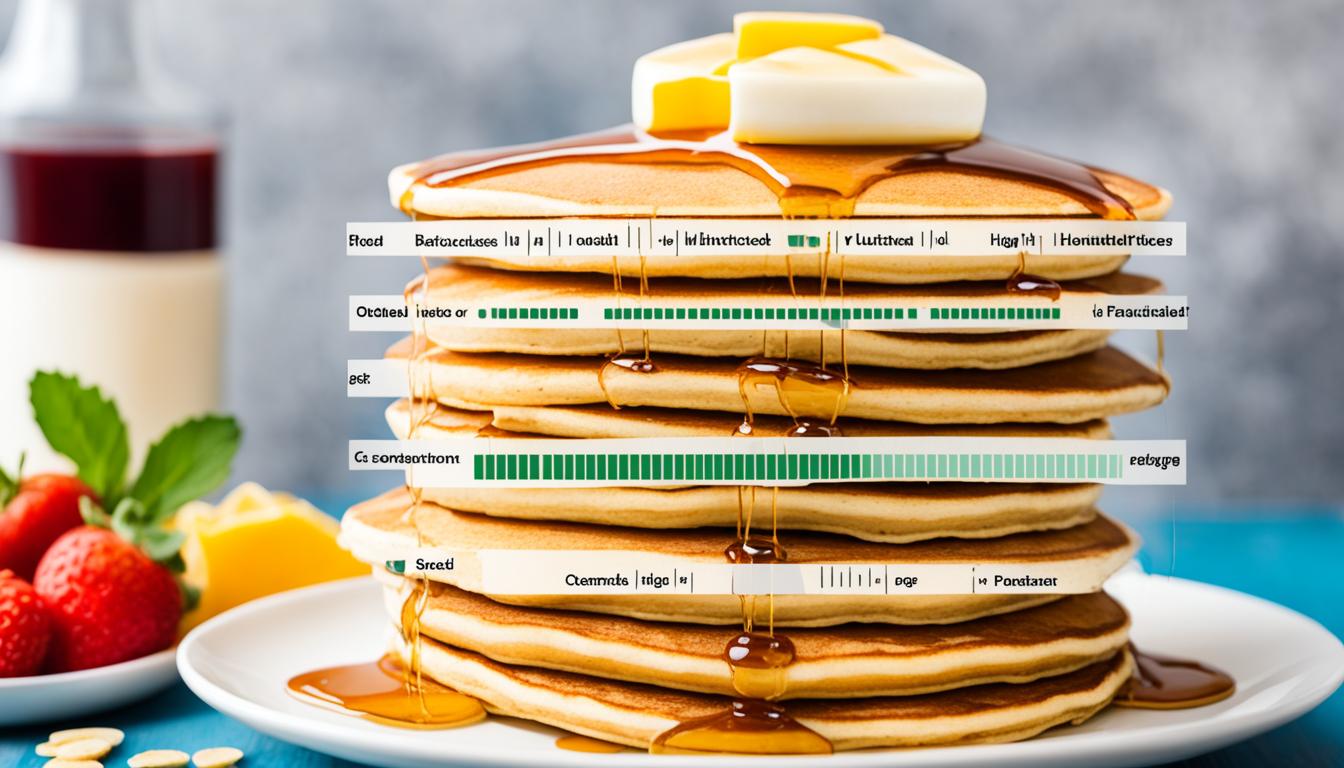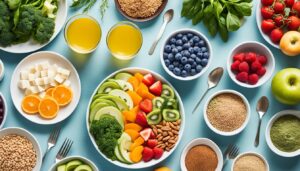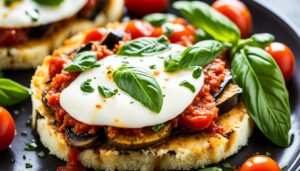Have you ever asked if pancakes are a healthy breakfast choice? You’re in the correct spot if you’re curious about their nutritional info. We’re going to look at what nutrition pancakes offer and if they can be part of a healthy diet.
In America, pancakes are a beloved breakfast for their fluffiness and many topping choices. But, are they truly beneficial for our health? It actually depends on the ingredients. For healthier pancakes, use whole wheat or whole grain flours. These flours are richer in fiber and nutrients than white flour, which has little nutritional value.
So, let’s dig into what pancakes add nutrition-wise.
Key Takeaways:
- Pancakes made with whole wheat or whole grain flours are a healthier option compared to those made with white flour.
- Pancakes are a good source of manganese, phosphorus, and riboflavin.
- Enjoying pancakes as part of a balanced diet can provide several health benefits.
With the basics covered, we’re ready to dive deeper into the nutritional value of pancakes in the next section.
The Nutritional Value of Pancakes
Choosing the right ingredients for pancakes makes a big difference. Whole wheat pancakes are healthier than white flour pancakes. They have more nutrients and fiber.
A medium whole wheat pancake has about 92 calories, 3g of fat, 13g of carbs, 1g of fiber, and 4g of protein. These facts show pancakes can be a healthy part of your diet. They give you energy to start your day right.
Pancakes also have important micronutrients for your health. Whole wheat ones are rich in riboflavin, manganese, phosphorus, selenium, and calcium.
Vitamin B2, or riboflavin, helps your body use energy well. Manganese is key for healthy bones and carb metabolism. Phosphorus keeps bones and teeth strong. Selenium boosts the immune system. Calcium is needed for bones and teeth too.
The Nutritional Breakdown of Whole Wheat Pancakes:
| Nutrient | Amount per pancake (44g) |
|---|---|
| Calories | 92 |
| Fat | 3g |
| Carbohydrates | 13g |
| Fiber | 1g |
| Protein | 4g |
| Riboflavin (Vitamin B2) | 0.09mg |
| Manganese | 0.6mg |
| Phosphorus | 81mg |
| Selenium | 4.1mcg |
| Calcium | 19.5mg |
These nutrients help with energy, bones, and the immune system. Choosing whole wheat pancakes lets you enjoy their taste while getting good nutrition.
Health Benefits of Pancakes
Pancakes are not only tasty but also offer health perks as part of your diet. Let’s look at the big health benefits of enjoying this breakfast favorite.
1. Good Source of Manganese
Pancakes give you manganese, an important mineral for energy and bones. It turns food into energy and keeps bones strong.
2. Rich in Phosphorus
Pancakes have phosphorus too, which is great for your health. It helps keep bones and teeth strong and supports cell function.
3. Riboflavin for Energy and Balance
Pancakes are a source of riboflavin or vitamin B2. This vitamin helps your cells make energy and keeps your metabolism going. It also helps regulate your appetite and sleep pattern.
Eating pancakes can boost your health as part of a balanced diet. Just add healthy toppings to make them even better for you.
“Pancakes are a versatile and delicious breakfast option that offers valuable nutrients for your body’s needs.”
Recipe Ideas for Pancakes
Want to make pancakes that are both healthy and tasty? Try out these recipe suggestions.
Pancake Batter Boosters:
- Add a handful of whole oats to the pancake batter for added fiber and texture.
- Mix in some fresh fruits like mashed bananas or blueberries for natural sweetness and vitamins.
- Sprinkle a handful of chopped nuts, such as almonds or walnuts, for added protein and healthy fats.
Festive Pancakes:
Make your pancake party more fun with colorful and creative pancakes.
- Add a few drops of food coloring to the pancake batter to create vibrant and eye-catching pancakes.
- Use different shapes or cookie cutters to make pancakes in various forms like hearts, stars, or animals.
Inventive Pancake Creations:
Try these unique ways to enjoy pancakes beyond the usual stack:
- Instead of hamburger buns, use two pancakes to make a tasty and original pancake sandwich.
- Turn leftover pancakes into personal-sized pizzas by adding toppings like cheese, vegetables, and marinara sauce.
- Roll up pancakes with fillings like cooked veggies, meatless sausages, cheese, eggs, and a drizzle of syrup for yummy pancake breakfast rolls.
If you love sweets, try red velvet pancakes as a yummy alternative to big cakes. Decorate them with whipped cream, fresh berries, or powdered sugar.
Be creative and try different ingredients and toppings to make healthy and delicious pancakes at home.
Whole Grain Pancakes and Alternatives
Whole grain pancakes are a smart choice for a healthy breakfast. They are made from flours that keep all parts of the grain. This means they have more fiber and nutrients. Eating whole grain pancakes lets you enjoy a tasty breakfast while getting good nutrition.
They are packed with important nutrients. You get vitamins like B6 and E, and minerals such as iron, magnesium, and zinc. These help your body make energy, keep your skin healthy, and fight off illnesses.
Looking for something different than traditional pancakes? Try using alternative flours. Almond, coconut, and buckwheat flours offer new tastes and textures. These options are gluten-free and add variety to your breakfast. They also bring extra nutrients and suit different dietary needs.
Check out these pancake alternatives:
- Almond Flour Pancakes: Almond flour gives pancakes a subtly sweet taste. It’s great for low-carb diets and rich in healthy fats.
- Coconut Flour Pancakes: Coconut flour brings a tropical flavor. It’s full of fiber and healthy fats and makes your pancakes naturally sweet.
- Buckwheat Pancakes: Buckwheat is a gluten-free choice packed with protein, fiber, and vitamins. It gives pancakes a rich, earthy flavor and is loved in many places around the world.
Try these alternative flours to get creative with your pancakes. There are so many flavors and nutrients to explore. Have fun mixing different flours and toppings to find your perfect pancake.
To make your pancakes even better, add delicious toppings. Greek yogurt makes them creamy. Fresh fruits add sweetness. Nut butter or nuts give a crunchy texture. These toppings make your pancakes tastier and more nutritious.
Enjoy the benefits of whole grain pancakes and try out different flours. Let your creativity lead you to make a delicious, nutritious breakfast. A good stack of pancakes can make you feel happy and ready to start your day.
| Pancake Alternative | Key Benefits |
|---|---|
| Almond Flour | Gluten-free, low-carb, high in healthy fats |
| Coconut Flour | Gluten-free, high in fiber and healthy fats, adds a tropical flavor |
| Buckwheat Flour | Gluten-free, rich in protein, fiber, and nutrients, adds an earthy taste |
Low-Calorie Pancakes
If you’re keeping an eye on calories, low-calorie pancakes are easy to make. Just swap some ingredients and choose wisely. With these tips and recipes, you’ll enjoy tasty pancakes that fit your diet.
1. Choose Lighter Ingredients
Start by picking healthier options. Go for non-fat or low-fat milk instead of regular milk. Swap oil or butter with unsweetened applesauce or mashed bananas. These changes cut calories and add sweetness and moisture.
2. Cut Down on Fat
Use egg whites instead of whole eggs to lower fat. Removing the yolks cuts calories and fat. Also, try sugar substitutes to cut down on calorie count.
3. Fresh Fruit Toppings
Top pancakes with fresh fruits like strawberries, blueberries, or bananas. They’re tasty, low-calorie, and full of nutrients. This makes pancakes even better.
“Switching to healthier ingredients and adding fresh fruit can make delicious low-calorie pancakes” – Nutritionist Jane Smith
Enjoy a guilt-free breakfast by following these healthy tips. Mix different flavors and toppings to find your perfect pancake recipe. Kickstart your day healthy without losing out on taste.
Here’s a simple low-calorie pancake recipe to try:
Healthy Banana Pancakes
- 1 ripe banana, mashed
- 1/2 cup non-fat or low-fat milk
- 1/2 cup whole wheat flour
- 1 teaspoon baking powder
- 1/2 teaspoon cinnamon
- 1/4 teaspoon vanilla extract
Instructions:
- Mix the mashed banana and milk in a bowl.
- Add flour, baking powder, cinnamon, and vanilla. Stir well.
- On medium, heat a skillet. Use cooking spray lightly.
- Pour 1/4 cup batter and cook until it bubbles.
- Flip it over. Cook until it’s golden brown.
- Do this with all the batter.
Enjoy your banana pancakes with cinnamon, Greek yogurt, and berries for a yummy breakfast.
Pancake Nutrition for Special Diets
Pancakes are a great breakfast choice for everyone. They can change to fit special diets. Whether you need gluten-free, vegan, or another special diet, there’s a pancake recipe for you.
Gluten-Free Pancakes
Gluten-free diet followers have many flour options for pancakes. You can use almond, rice, or gluten-free oat flours. These make pancakes that taste great without using wheat.
Vegan Pancakes
Vegans can enjoy pancakes too, without animal products. Use flax or chia seeds mixed with water as an egg alternative. This mix acts as a binder in vegan pancakes.
Plant-based milks like almond or soy milk can replace dairy milk. This makes the pancakes vegan-friendly and tasty.
Pancakes for Specific Diets
There are pancake options for various dietary needs. If you’re eating low-carb, try pancakes with coconut or almond flour. These flours have fewer carbs than traditional ones.
For keto or paleo diets, recipes use ingredients that fit these plans. Ingredients like coconut flour and sugar substitutes keep macros in check.
Always check recipes and ingredients to make sure pancakes meet your diet. With some creativity, you can enjoy pancakes that fit your specific needs.
| Pancake | Calories | Fat (g) | Carbohydrates (g) | Fiber (g) | Protein (g) |
|---|---|---|---|---|---|
| Gluten-Free Pancake | 110 | 2 | 20 | 2 | 3 |
| Vegan Pancake | 90 | 1 | 15 | 2 | 2 |
| Low-Carb Pancake | 80 | 1 | 6 | 3 | 10 |
Pancake Nutrition for Weight Loss
Pancakes can be both delicious and good for weight loss if you’re careful. Eat them in moderation and choose healthy toppings. Even though pancakes might not seem weight loss-friendly, smart choices allow them to fit into your diet. Go for whole grain pancakes and low-calorie toppings to help you lose weight without giving up this breakfast treat.
Whole grain pancakes are better than white flour ones. They have more fiber, making you feel full longer. This fiber helps with digestion and can curb hunger, aiding weight loss. Plus, they pack vitamins and minerals, like B vitamins and iron, boosting your health.
For toppings, select options that won’t negate your weight loss efforts. Fresh fruits like berries or banana slices are sweet yet low in calories. Greek yogurt is another excellent pick, being protein-rich and low-fat. Adding a bit of honey can sweeten pancakes without too many calories.
Watch your pancake portions for weight loss. Keep an eye on pancake size and balance your meal with protein and healthy fats. This might mean adding eggs or lean meats, and maybe some nuts or nut butter. Watching your meal’s total calories and portion sizes lets you enjoy pancakes without compromise.
Besides eating pancakes wisely, a balanced diet and regular exercise are key. They create the calorie deficit needed for weight loss. Add healthy foods and stay active daily to meet your weight loss goals.
Benefits of Pancakes for Weight Loss
Pancakes offer benefits for those looking to lose weight:
- Whole grain pancakes supply nutrients and fiber, aiding digestion and keeping you full.
- Choosing toppings like fresh fruits and Greek yogurt keeps meals tasty yet low in calories.
- They make breakfast enjoyable, supporting your weight loss plan without feeling restricted.
Remember, weight loss is a journey that includes enjoying your favorites in moderation. By making smart choices and practicing portion control, pancakes can be part of a successful weight loss diet.
Pancake Nutrition for Children
Pancakes are a good choice for kids if you use whole grain flour and healthy toppings. They give energy, help with muscle growth, and have vitamins and minerals needed for kids to grow well.
You can make pancakes fun by shaping them or adding things like bananas or apples. This makes them taste better and adds health benefits. Kids will like the taste, and you’ll know it’s good for them.
Try to use less sugar with pancakes for kids. A little maple syrup or powdered sugar is fine sometimes. But too much is not good. Instead, use toppings like fresh fruit, yogurt, or nut butter. These are tasty and much healthier.
“Children need a variety of nutrients to support their growth and development. Pancakes made with whole grain flours and served with nutrient-rich toppings can provide them with the essential vitamins and minerals they need.”
Offer different toppings to make mealtime fun. Let kids pick and mix their own. This helps them like healthy foods more and make better food choices.
Serve pancakes with a balance in mind. Even though they’re nutritious, kids need other foods too. Add proteins like eggs or yogurt and some fruits or veggies. This makes a complete and healthy meal.
Benefits of Pancakes for Kids:
- Provide energy for active kids
- Offer a good source of protein for muscle growth and repair
- Supply essential vitamins and minerals for growth and development
- Can be made with whole grain flours for added fiber and nutrients
- Allow for creative toppings to introduce new flavors and textures
Making pancakes a part of a balanced meal helps children enjoy a tasty and healthy breakfast or brunch. Since you can change up the toppings, pancakes can meet any child’s tastes. Start your child’s day with a smile and a nutritious stack of pancakes.
Conclusion
Pancakes can be both healthy and delicious as part of a balanced diet. They are made even better with whole grain flours and nutrient-rich toppings. These ingredients add essential nutrients like manganese and calcium, which are good for your health.
Pancakes can easily be adjusted to meet different dietary needs. This makes them a great choice for everyone, no matter their age or diet.
By choosing whole grain pancakes, you get more fiber, vitamins, and minerals. You can also make pancakes more exciting by adding oats, fruits, or nuts. This turns a simple meal into a fun experience to share with family and friends.
Next time you want a tasty breakfast, pick pancakes. Enjoy them without worry as a nutritious and delightful meal. They’ll make both your taste buds and your body happy.





